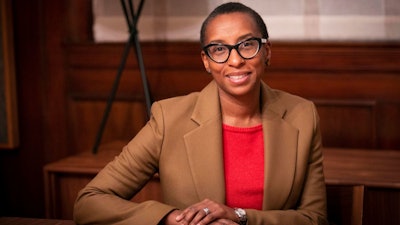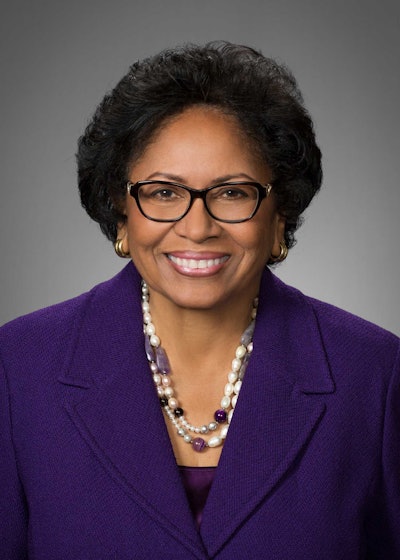 Dr. Claudine Gay, president-elect of Harvard University.
Dr. Claudine Gay, president-elect of Harvard University.
Gay, dean of Harvard University’s Faculty of Arts and Sciences, will succeed current Harvard President Dr. Lawrence S. Bacow on July 1, 2023. Gay’s appointment marks the first time a person of color will lead the nation’s oldest and one of its most prominent postsecondary institutions.
Gay will be only the second woman to take the role.
“I am honored to stand before you as the next president of Harvard University,” Gay said at a press conference following the announcement. “I love this place. Harvard is where I found my intellectual home. It has nurtured and inspired me since I first set foot in the yard. I am deeply invested not only in what Harvard is today but also what its leadership means for the future.”
Gay will be the second Black woman to lead an Ivy League university, following Dr. Ruth Simmons, who served as president of Brown University from 2001 to 2012.
 Dr. Ruth Simmons, president of Historically Black College and University (HBCU) Prairie View A&M University.
Dr. Ruth Simmons, president of Historically Black College and University (HBCU) Prairie View A&M University.
Experts in higher education, diversity, equity and inclusion celebrated the news, hoping it could signal to other institutions that it is time for more diverse leadership. Gay’s appointment comes on the heels of the U.S Supreme Court case Students for Fair Admissions vs. Harvard College, which could end affirmative action, the consideration of race in admissions.
Dr. Charlie Nelms, chancellor emeritus of North Carolina Central University said this appointment is indicative of how far historically disenfranchised people can go if given the opportunity.
“If given opportunities, we always meet and exceed the expectations,” said Nelms. “It is my hope that other institutions of higher learning, public and private, will see this as an opportunity for them to step up to the plate, they will move in the direction of acknowledging and appointing people who have the talents and skills necessary to provide leadership for contemporary institutions.”
Dr. Shaun Harper, provost professor of education and business at the University of Southern California, agreed with Nelms, adding that he hopes Thursday's announcement “ignites a sustainable shift in the diversification of the college presidency. Achieving this will require others to follow Harvard’s lead.”
Gay was born to Haitian immigrants, who came to the U.S. and put themselves through college while raising a family. She joined Harvard in 2006 as a professor of government and African and African American studies. Gay’s work has often centered the experience of Black people, particularly Black women, said Dr. Charles H. F. Davis III, an assistant professor in the Center for the Study of Higher and Postsecondary Education at the University of Michigan.
“With vigilant support from Harvard’s most powerful constituencies, I have no doubt her tenure can absolutely be as good as its promise,” said Davis.
Dr. Frank Harris III, interim associate dean for diversity, equity and inclusion and professor of administration, rehabilitation and postsecondary education at San Diego State University, seconded Davis’s call for full-throated support for Gay, adding that it was “about time Harvard hired a woman of color as president.”
“I hope she gets the support that she needs from her colleagues and other folks, other stakeholders at Harvard,” said Harris. “The job will be challenging for anyone, but especially when you’re the first Black woman in that role.”
Dr. Marybeth Gasman, associate dean for research in the Graduate School of Education at Rutgers University, said that, because many institutions can be influenced by Harvard’s decisions, Gay’s presidency “will pave the way for Black women and women of color across the nation to be in the position that they have long deserved to be in.”
Harris agreed.
“For better or worse, when Harvard does something, it gives other institutions permission—a lot of folks look to Harvard as a leader,” said Harris. “The first woman of color who was hired as president at a four-year university happened in 1955, Dr. Willa B. Player [at Bennett College.] That was a long time ago. The fact that we’re still having these firsts—how far we’ve come but how far we still have to go—it’s pretty telling.”
Liann Herder can be reached at [email protected]
Jon Edelman and Arrman Kyaw contributed to this article.






















